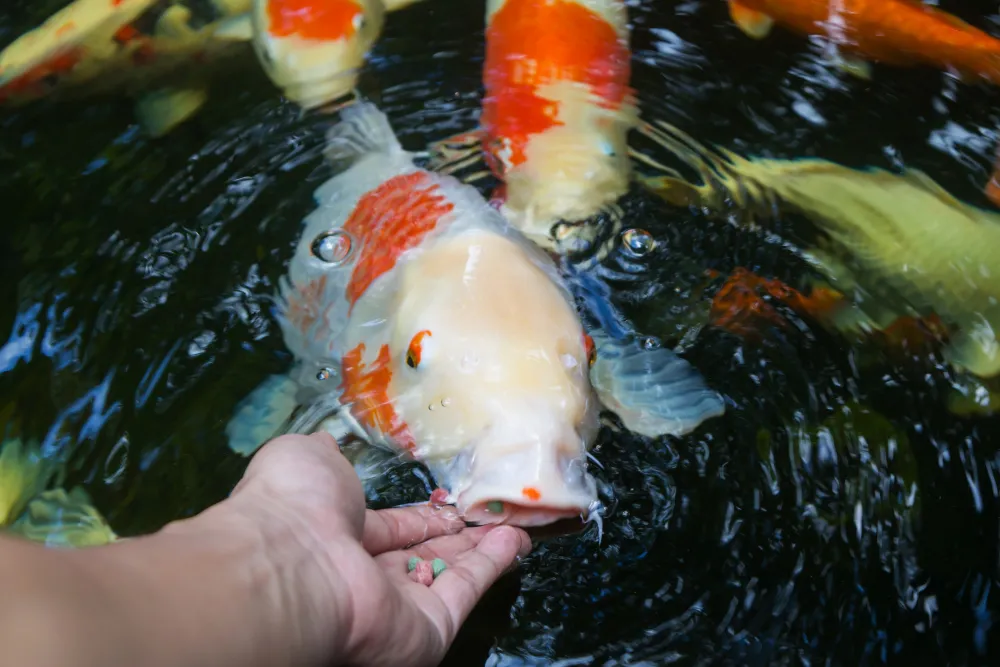

Koi Fish Behavior: Understanding Their Unique Habits and Traits
koi fish behavior, Koi fish are like the celebrities of the aquatic world—graceful, colorful, and full of personality. But what exactly makes these pond dwellers tick? Whether you’re a seasoned koi keeper or just diving into the hobby, understanding koi behavior can help you create a healthier and happier environment for your finned friends.
What Makes Koi Fish Unique?
Koi fish originated in East Asia and have been selectively bred for centuries to create their dazzling array of colors and patterns. Beyond their beauty, koi hold cultural significance, symbolizing prosperity, perseverance, and good fortune in many cultures.
General Behavior of Koi Fish
Social Nature of Koi Fish
Koi are social butterflies—er, fish! They thrive in groups and exhibit strong social bonds. You’ll often find them swimming together in synchrony, which is both mesmerizing and a sign of their comfort in the environment.
Interactions Within Their Group koi fish behavior
Koi have a hierarchy in their groups. Larger or older koi often dominate feeding times, while younger ones take a backseat. Watching their interactions can be as captivating as any reality show.
Feeding Behavior koi fish behavior
Koi are natural foragers, and their curiosity peaks during feeding time. Toss some food into the pond, and they’ll swim up eagerly, showcasing their healthy appetite. Be cautious, though—overfeeding can lead to health issues like bloating or poor water quality.
Koi Swimming Patterns
Normal Swimming Behaviors
A healthy koi glides effortlessly through the water. If they’re darting erratically or gasping at the surface, it might indicate stress or poor water conditions.
How Seasons Influence Koi Movement
In colder months, koi enter a semi-dormant state, swimming sluggishly and conserving energy. Come spring, they’re back to their active, playful selves.
Communication Among Koi
Koi communicate using body language. Quick tail flicks, nudges, and changes in swimming direction can signal anything from curiosity to discomfort.
Aggression in Koi Fish
While koi are generally peaceful, occasional aggression can occur, especially during breeding or when space is limited. Providing plenty of room and hiding spots can help mitigate conflicts.
Recognizing Stress in Koi Fish
Common Stressors
Poor water quality, overcrowding, and sudden temperature changes are major stressors for koi.
Behavioral Indicators
A stressed koi might isolate itself, lose appetite, or exhibit unusual swimming patterns.
Breeding Behavior
When breeding, male koi chase females around the pond. This activity can look intense, but it’s a natural part of the process.
Playful Behavior in Koi Fish
Ever seen your koi nudge floating objects or follow your hand during feeding? These are signs of their playful and curious nature. Adding pond-safe toys can keep them entertained.
Bonding with Humans
Koi are surprisingly personable. Over time, they learn to recognize their owners, especially those who feed them. A consistent feeding schedule and gentle interactions can strengthen this bond.
Territorial Behavior
Koi aren’t particularly territorial, but overcrowding can lead to disputes. Providing ample space is key to maintaining harmony.
Understanding Koi Sleep Patterns
Koi do rest, but they don’t have eyelids to close. Instead, they become less active and hover near the bottom of the pond, often at night or during quiet times.
Conclusion koi fish behavior
Understanding koi behavior isn’t just fascinating—it’s essential for their well-being. By observing their habits, you can detect potential issues early and provide the care they need. Whether it’s their playful antics, social interactions, or the way they bond with you, koi have a way of stealing your heart (and maybe your attention, too).
FAQs koi fish behavior
- Why do koi fish sometimes jump out of the water?
They might be trying to escape poor water conditions or simply showcasing their playful nature. Check your pond’s water quality to rule out any issues. - What does it mean if koi fish stay at the bottom of the pond?
This could indicate cold temperatures, stress, or illness. Monitor their behavior and test water conditions. - How can I tell if my koi fish are sick?
Look for signs like lethargy, loss of appetite, unusual swimming patterns, or visible lesions. - Are koi fish intelligent?
Yes! Koi can recognize their owners, remember feeding times, and even learn tricks. - Do koi fish recognize their owners?
Absolutely. Over time, koi associate their owners with food and may even swim up to greet you.
You may also like
- https://giobelkoicenter.com/the-ultimate-guide-to-the-biggest-koi-fish/
- https://giobelkoicenter.com/koi-fish-lucky/
- https://giobelkoicenter.com/the-meaning-behind-koi-fish-colors/
- https://giobelkoicenter.com/the-most-expensive-koi-fish-ever-sold/
- https://giobelkoicenter.com/dumbo-ear-mosaic-guppies/
- https://giobelkoicenter.com/about-koi-fish/
Table of Contents
Passionate about fish keeping since elementary school in the 1980s, Giovanni Carlo has dedicated countless hours to collecting and breeding a diverse array of ornamental freshwater fish. From vibrant guppies and majestic koi to striking bettas and classic goldfish, he continues to explore the fascinating world of aquatics, sharing knowledge and enthusiasm with fellow fish enthusiasts.